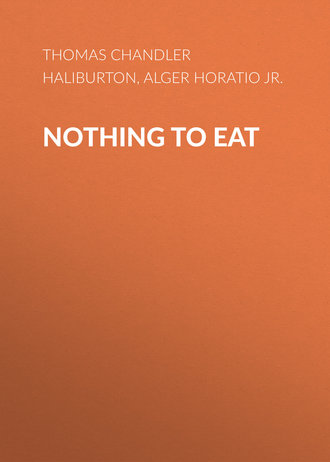полная версия

Thomas Chandler Haliburton
Nothing to Eat
Mrs. Merdle Accepteth of a slight Dinner, suitable for a Woman suffering with Dyspepsia
Some turkey? why yes—the least mite will suffice;
A side bone and dressing and bit of the breast;
The tip of the rump—that’s it—and one o’ the fli’s—
In spite of the doctor: my appetite’s none of the best,
And so I must pamper the delicate thing,
And tickle a fancy that’s very capricious
With bits of a turkey, the breast or the wing,
With beef very tender, and gravy delicious.
Some beef now? I thank you, not any at present;
I’ll nibble a little at what I have got,
And wish for a duck, or a grouse, or a pheasant,
Though none of them come for a wish, in the pot.
Mrs. Merdle Discourseth of Wishes and her Sufferings
‘If wishes were horses’—I’ve heard when a girl—
‘If wishes were horses, the beggars would ride’—
If wishes were pheasants, I’d wish with a skirl
Till cooked ones came flying and sat by my side.
A fig, then, for doctors, their tinctures and drugs;
Good eating would cure me, with plenty of game;
And as for pill boxes, and bottles, and jugs,
I wouldn’t know one, when I saw it, by name.
Oh, dear! such a load now my stomach oppresses,
While eating these trifles, attempting to dine—
I’m sure ‘taint the turkey—it must be my dresses—
And if so ‘t will ease them to sip sherry wine.
‘Tis sad, though, to be such a sad invalid—
Dear me, Colonel Dinewell, you’ve done eating meat—
Your doctor, like mine, I hope hasn’t forbid,
That you shouldn’t have, as I do, so little to eat.
Ah! well then, I see, though I’ve hardly begun,
The meats and the solids must go right away;
So bring in the pudding, if Susan’s got one,
Which will for a while one’s appetite stay.
Mrs. Merdle Discourseth of Pudding
A pudding! why yes, as I live, too, it’s plum;
So plain, Susan makes them on purpose for me
I never refuse, when the plum puddings come,
To finish my dinner, if finished ‘t can be
On things unsubstantial, like puddings and pies,
So made up of suet, and currants, and flour,
Like this one before us, to get up the size,
And stirred up and beaten with eggs by the hour,
With bread crumbs, and citron, and small piece of mace;
With nutmeg, and cinnamon, and sugar, and milk,
And” currants, and raisins, and spices so race,
And what else I know not of things of that ilk.
The whole after cooking six hours at the least,
When thus well compounded with delicate skill,
With wine sauce is eaten, to finish the feast,
And suits the digestion of ladies quite ill,
Who suffer as I do, from having bad cooks,
And very weak stomachs, and food that near kills ‘em;
And then such a sight of bad rules in the books
From contents to finis, to cure one that fills ‘em.
There’s one of all others so much recommended
To cure every ill of old Eve’s every daughter,
With nothing or next to’t, for medicine expended,
For nothing to cure with is used but cold water.
And what with the bathing, and washing, and scrubbing;
The packing, and sweating, and using the sheet;
The shower bath, and douche bath, and all sorts of rubbing;
And literally nothing but brown bread to eat,
No wonder the patient accepts of the lure,
To escape such a ducking, acknowledged a cure.
But Lord, what a skein I have made of my yarn,
While Susan’s arranging and changing the plates,
And running all round old Robin Hood’s barn,
Like puzzles at school that we made on our slates;
But talking of puzzles, no one that we made,
While playing the fool we played as a trade,
When childhood and folly joined hands at the schools,
Could equal the pranks of these cold-water fools.
Yes, yes, Mr. Merdle, I knew by the smelling
The pudding was ready, without any telling;
So Colonel, I’ll help you a delicate slice—
For nothing, I’m sure, like a dinner you’ve eaten—
And afterwards follow with jelly and ice,
So pleasant while waiting to cool off the heat on;
And then with a syllabub, comfit, or cream,
Our dessert of almonds and raisins we’ll nibble,
Till coffee comes in to revive with it’s steam,
When cakes in its fragrance we’ll leisurely dibble.
I’m sure after all it’s a terrible bore
To labor so hard as we do for our victuals;
I envy the women that beg at the door,
Or hire out for wages to handle your kettles,
And wash, bake, and iron, and do nothing but cooking,
So rugged and healthy, and often good looking:
The doctor has told me except when they’re mothers,
They never take tincture, or rhubarb, or pill,
And swears the profession if there were no others,
Their patients would use up, and starve out and kill.
I’m sure I don’t see how that makes them exempt
From all sorts of sickness and woman’s complaints,
With nothing to hinder if appetite tempt
From eating or drinking as happy as saints.
Oh Lord, now, this pudding so delicate made,
And gravy I’m sure with nothing that’s rich in,
That one of those women who beg as a trade,
The whole in one stomach could leisurely pitch in,
Is now in my own so terribly painful in feeling,
Its calls for relief are most loudly appealing.


